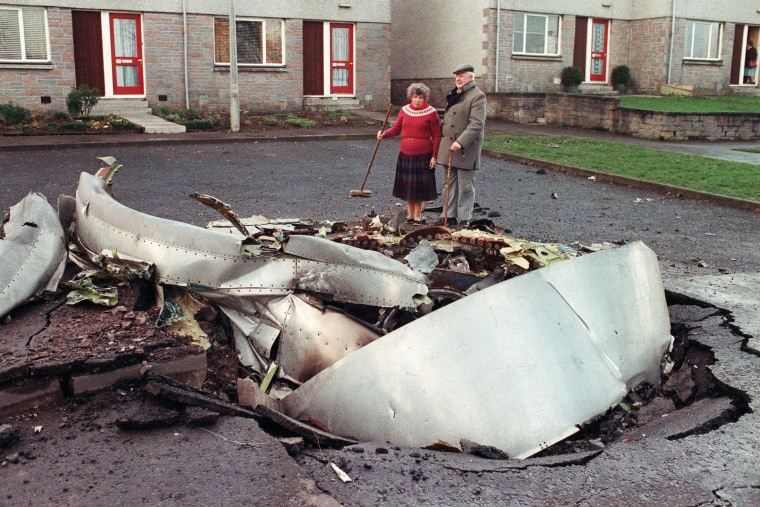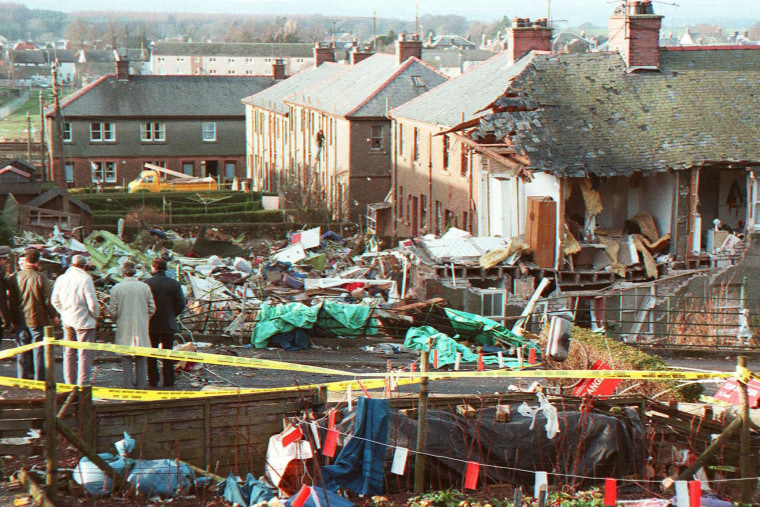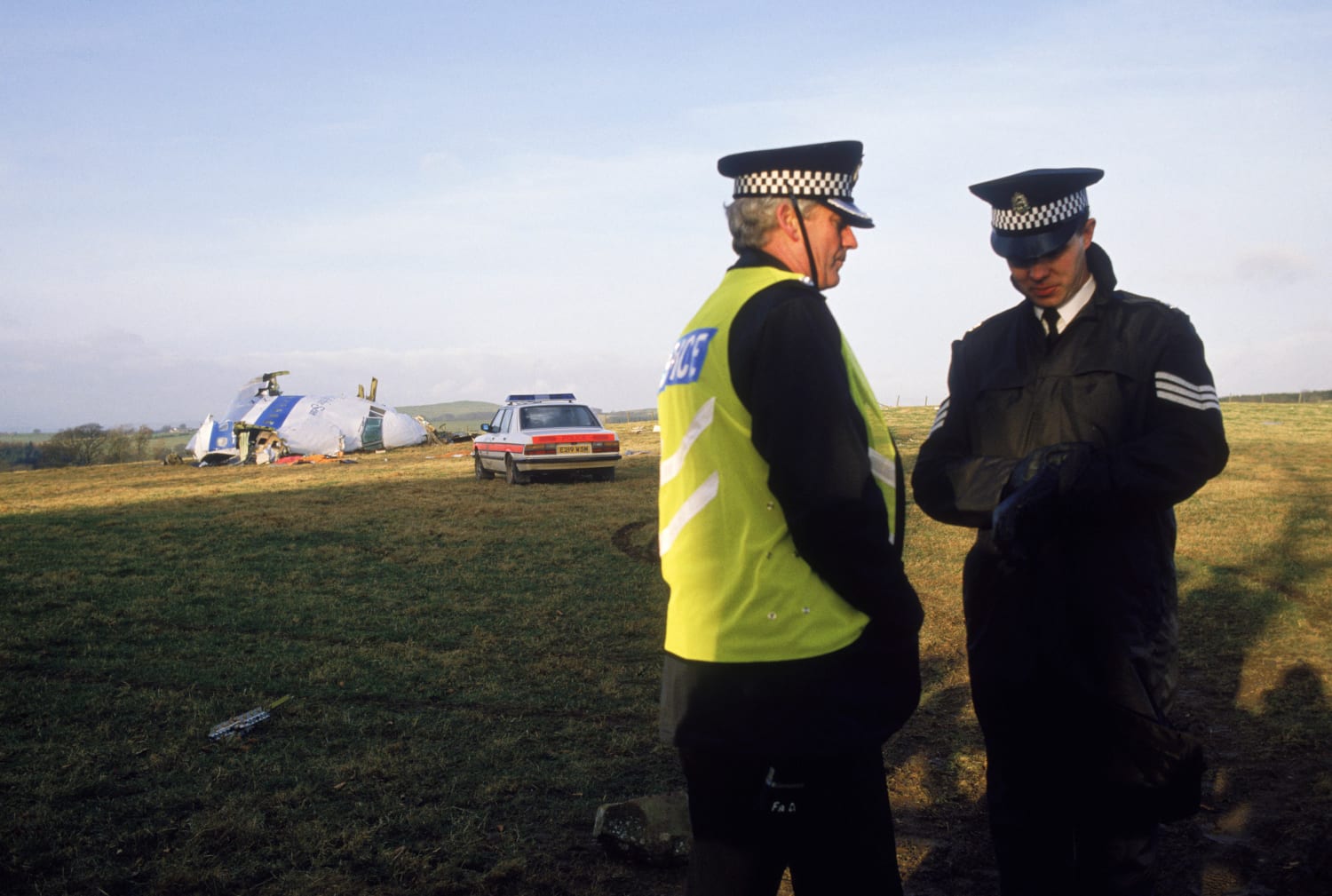Investigators said the bomb was in a Samsonite suitcase which was taken on board via a feeder flight from the Mediterranean island nation of Malta.
All 243 passengers and 16 crew were killed. A family of four was among the 11 residents to be killed on the ground.
In total, 190 Americans and 43 British citizens died, along with 19 other nationalities.
The impact caused a crater more than 150 feet deep and was strong enough to be measured as a seismic event, the FBI said. Debris from the crash was scattered over 845 square miles.
Who has just been charged and why?
Mas’ud is the first person to be charged on American soil in connection with the disaster.
The Justice Department charged him with two criminal counts in December 2020, accusing him of working in various capacities for Libyan intelligence services, including as a technical expert in building explosive devices, from approximately 1973 to 2011.
The U.S. case is partly based on an interview Mas’ud gave to Libyan law enforcement in 2012 after he was taken into custody following the collapse of the regime of Moammar Gadhafi, the country’s longtime ruler.
In that interview, U.S. officials said that Mas’ud admitted building the bomb in the Pan Am attack and working with two other conspirators to carry it out.
He also said the operation had been ordered by Libyan intelligence and that Gadhafi thanked him and other members of the team after the attack, according to an FBI affidavit filed in the case.
However, some observers have questioned the validity of this evidence, given the political and military turmoil in Libya in 2012, the same year Ambassador Christopher Stevens and three other Americans were killed during an attack on a U.S. diplomatic outpost in Benghazi.
“The case against him apparently rests on a confession that he made in custody, which given the situation in Libya and that there wasn’t a functioning legal system at the time, you have to question whether or not that confession should be given any weight,” said John Ashton, an author who has written about Lockerbie, including a book in collaboration with al-Megrahi.
Ashton also questioned how Mas’ud came to be in custody in the U.S. — something that remains unclear.
Late last month, local Libyan media reported that Mas’ud had been kidnapped by armed men from his residence in Tripoli, the capital. That reporting cited a family statement that accused Tripoli authorities of being silent on the abduction.

Who else has been charged?
Former Libyan intelligence officer Abdelbaset al-Megrahi was tried by a panel of three Scottish judges in 2001 at a special court in the Netherlands. He was convicted of 270 counts of murder, was given a life sentence and was the only person convicted for their involvement in Lockerbie.
A Maltese shopkeeper identified al-Megrahi during the 2001 trial as the man who bought clothes that were found to have been in the suitcase, therefore linking the Libyan to the explosive. His family and some legal commentators have cited concerns about the evidence.
Al-Megrahi was indicted by British and American authorities in 1991, but Libya would not allow his extradition and instead placed him under house arrest for more than seven years. Eventually Gadaffi agreed to a trial in a neutral country — the Netherlands — under Scottish law.
Al-Megrahi lost one appeal and abandoned another before he was freed in 2009 on compassionate grounds because he was terminally ill with cancer, having served 8.5 years. Still protesting his innocence, he died in Libya three years later.
Another alleged Libyan intelligence operative, Lamen Khalifa Fhimah, was acquitted of all charges.

What was the fallout?
The U.S and the U.K. spent years trying to extract an admission of guilt and compensation to the victims from Libya, using sanctions as a tool to exert pressure.
This came in 2003 when Libya’s ambassador to the United Nations, Ahmed Own, said his country claimed “responsibility for the actions of its officials” relating to Lockerbie, and paid $8 million to each victim’s family minus the bill for some huge legal fees. U.S. and U.N. sanctions were then lifted.
The momentous decision to release al-Megrahi in 2009 was taken by Scottish Justice Secretary Kenny MacAskill — experts have called this the most important diplomatic decision ever taken by the Scottish government, which has legal powers separate to the British government in London.
The release was met with scenes of jubilation in Libya, where al-Megrahi was greeted by thousands of well-wishers in the capital, Tripoli. President Barack Obama called the decision a mistake. Susan Cohen, from New Jersey, whose 20-year-old daughter, Theodora, died in the attack, said at the time: “”I think it’s appalling, disgusting and so sickening I can hardly find words to describe it.”
What are the families saying now?
“This is what we’ve been fighting for,” said Kara Weipz, president of the Victims of Pan Am Flight 103 and sister of Richard Monetti, one of the Syracuse students who was killed in the disaster.
“This was a major coordinated effort by many parts of our government, and we are just grateful,” she told Politico after news of the arrest Sunday. “Not that this is over by any stretch, but it’s a great first step.”
Jim Swire, a British doctor whose daughter Flora died on board Flight 103, told the BBC that any trial of Mu’sa should take place in the U.S. or the U.K. He is among the victims’ family members who question the evidence used to convict al-Megrahi in 2001.
Another simply called the news overwhelming.
Source: | This article originally belongs to Nbcnews.com










